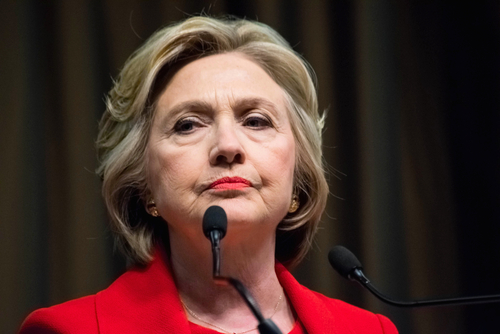
In a recent interview, Hillary Clinton criticized former President Donald Trump, calling him a “wannabe dictator” and accusing him of having undue admiration for Russian President Vladimir Putin. This statement has reignited discussions about the political landscape, drawing attention to the ongoing debate over foreign aid and national priorities.
Clinton’s comments came amid discussions about a stalled Senate aid bill, which she argues would have passed overwhelmingly if brought to the House floor. According to her, the failure to advance this bill is not just a legislative hiccup but a deliberate choice by House Republicans to prioritize Trump’s agenda over America’s broader interests. This accusation adds another layer to the complex dynamics of U.S. politics, where foreign aid and domestic policy are often intertwined.
“You should be ashamed of yourself! You have blood on your hands!”
Pro-Palestinian activists protested against Hillary Clinton during her speech at the Cinema For Peace foundation’s event in Berlin, Germany, on February 19 pic.com/RAb7s40JBP
— TRT World (@trtworld) February 20, 2024
The bill in question aimed to allocate significant funds to various foreign countries, including a substantial package for Ukraine, while critics argue it neglected the pressing issues at the U.S. border. The rejection of this bill by Republican Senators and its subsequent failure in the House has sparked a heated debate on the allocation of national resources and the direction of U.S. foreign policy.
Clinton’s critique extends beyond legislative disagreements, touching on the personal dynamics between Trump and Putin. By calling Trump “enamored of Putin,” she revives longstanding concerns about Trump’s foreign policy approach and his administration’s dealings with Russia. This comment has stirred controversy, with supporters and detractors of Trump clashing over the implications of such a relationship.
Joe Rogan DESTROYS Hillary Clinton
Who agrees that Hillary needs to go to prison for treason murder and child trafficking pic.com/KVezJEESIy
— 🕊 𝓐𝓷𝓷 𝓲𝓼 𝓡𝓲𝓰𝓱𝓽 🕊 𝐗𝐋𝐕 (@Ann_Lilyflower) February 15, 2024
The fallout from Clinton’s interview underscores the deep divisions within American politics, particularly regarding how the U.S. engages with the rest of the world. While some view the stalled aid bill as a missed opportunity to assert American leadership and support international allies, others see it as a necessary stance to refocus attention and resources on domestic challenges.
This debate is not just about foreign policy but also about the vision for America’s future. Clinton’s remarks have catalyzed a broader discussion on the role of the U.S. on the global stage, the balance between foreign and domestic priorities, and the influence of individual leaders’ personalities on international relations.
As the conversation unfolds, it is clear that the issues at hand go beyond partisan politics. They touch on fundamental questions about America’s identity, values, and responsibilities. Whether one agrees with Clinton’s characterization of Trump or not, her comments have undeniably sparked a vital dialogue on what it means to lead in an increasingly complex and interconnected world.
In the end, the controversy surrounding Clinton’s interview with Christiane Amanpour serves as a reminder of the ongoing struggle to define America’s place in the world. As the nation grapples with these questions, the debate over foreign aid, border security, and leadership styles will undoubtedly continue to shape the political landscape for years to come.




GIPHY App Key not set. Please check settings